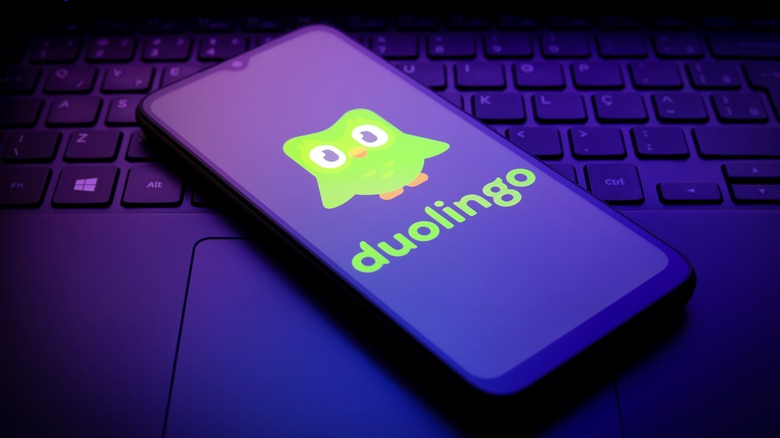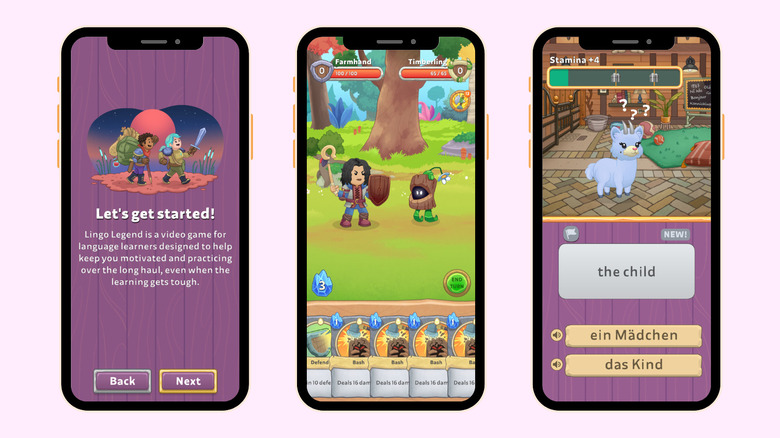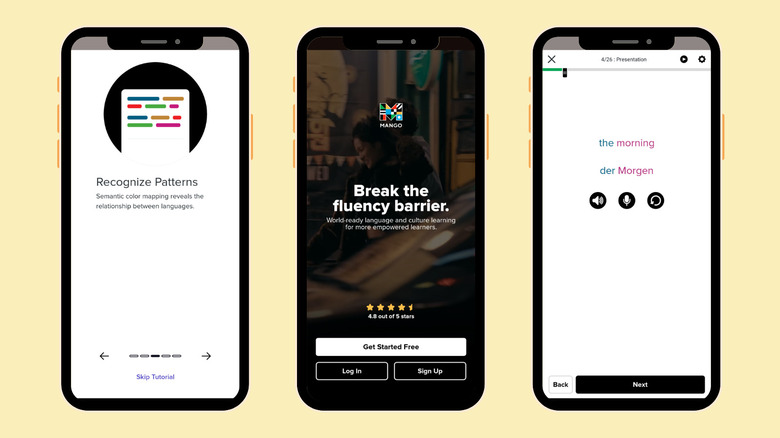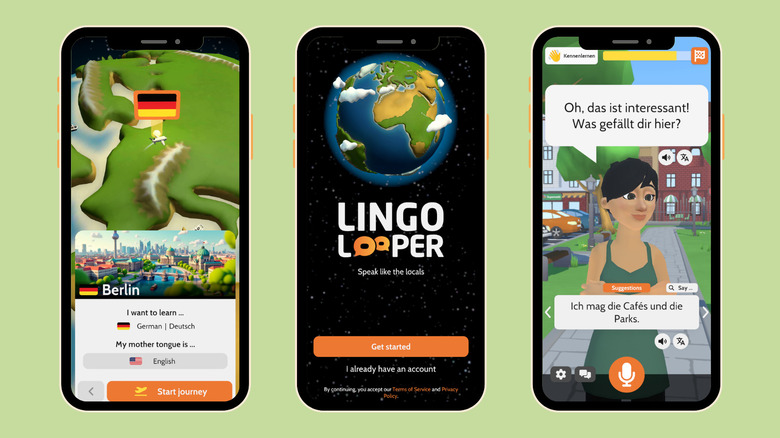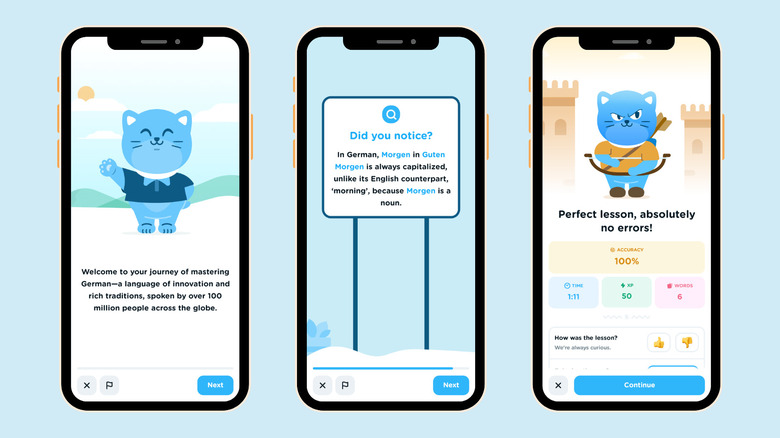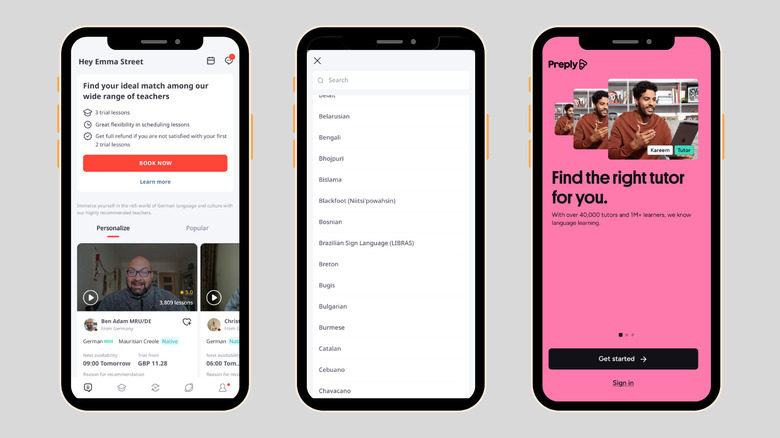4 Of The Best-Rated Duolingo Alternatives
Duolingo is facing a backlash since it announced a couple of days ago that it is going to be an "AI-first company". In an email from the CEO, Luis von Ahn, which was reposted on Duolingo's LinkedIn account, he said Duolingo was going to replace "slow, manual content creation" with AI. Von Ahn accepts that this move could negatively impact Duolingo's quality. "We'd rather move with urgency and take occasional small hits on quality than move slowly and miss the moment".
Whether AI is the future or just passing hype is still up for debate. However, many users, on Reddit and elsewhere, are taking this as a cue to leave the app and kiss goodbye to their streak score. "Language learning is about good content, not mass content," said one disgruntled Redditor. Another poster commented, "AI is not advanced enough for what Duolingo needs."
If you've also decided to say goodbye to the green owl, you might be wondering what other language learning apps are popular with users. We've taken a look at four apps that score highly on the Google Play Store and Apple's App Store. You can read more about how they were selected in the methodology section at the end of the article. Where possible, we have tried to find out how much AI different apps use, but we can't guarantee that any of the apps listed are AI-free. In fact, some of them proudly boast of their AI credentials.
Lingo Legend lets you game while you're learning
Lingo Legend has a user review score of 4.7 on Google Play Store and 4.9 on Apple's App Store and combines gameplay with language learning. The game has two adventures, so you can choose between helping out on a farm or battling monsters. Naturally, when I tested the app, I opted for the monsters. Who wants to grow crops when you can battle sentient tree stumps? I actually found the game quite distracting and would rather focus on language learning when I only have a few minutes each day to do it. However, that just shows that I'm not Lingo Legend's target customer. The game is what sets it apart from its competitors. It's not a gamified learning tool, it is an actual, playable game that also teaches you a foreign language.
A reviewer on the App Store described it as a "fun little game with an easy-to-understand combat system, nice character design and animation, and a good soundtrack." Another reviewer wrote, "I am obsessed! I used to use Duolingo all the time, but it eventually became very repetitive, and it wasn't as fun anymore. This game is continuously fun as there is so much to do. I love how they turned learning a language into an RPG battle."
It only supports 10 languages, which is fewer than many other apps, and is available on Android and iOS. You can get about five lessons per day for free, and you can subscribe to get more gameplay. It costs $9.99 per month, with savings if you sign up for a three-month or yearly subscription. You can also purchase a lifetime subscription for $89.99.
Mango is a straightforward learning tool
Mango rates 4.7 on Google Play Store and 4.8 on the App Store. It's very much the opposite of the brightly colored fantasy world gameplay of Lingo Legend. Mango is a pared-down, straightforward language learner, so it's a good choice for people who find even the cartoon characters in DuoLingo a bit much. There are no games, points, or streaks, just straightforward language and grammar lessons on your phone. As well as vocabulary, the app also teaches key language fundamentals along the way, such as how pronunciations can shift when combining words and phrases.
Mango is supported by libraries, schools, and other institutions, so if you're in the U.S. or Canada, there's a good chance you'll be able to access it for free. You can check if you can access a free version from within the app by providing your location. You can also pay for a subscription. It costs $11.99 per month, with reduced rates for longer time periods, and special deals for multiple languages. Your first lesson is free and paid subscriptions include a 14-day free trial. It offers courses in 70 different languages and is available online and on Android and iOS. A reviewer on Google Play Store commented, "Mango is the best language learning tool I've found. The spaced repetition works even when you don't think it does. I'm surprised at my retention."
Mango isn't completely AI-free, though. It released a statement last August, which explained that after 15 years of only using native-speaking human beings to record all its audio recordings, it was adopting AI text-to-speech in parts of the app. For the moment, though, course creation and quality control are still carried out by humans.
LingoLooper gives you AI Avatars to chat to
If you're looking for a less AI-powered app than Duolingo, then LingoLooper may not be the best choice for you. It wears its AI credentials loud and proud. LingoLooper is made by Swedish company Lumi Labs, who describe it as "the first fully immersive AI-powered language learning app." They do seem to be advertising for (human) creators, though, so it may still have more human involvement than Duolingo.
LingoLooper is a new app that's still in its early access phase. It has only had 50,000 downloads on Google, compared to Duolingo's 500 million. It scores highly with users, though, with 4.8 on both Google Play Store and Apple App Store. The app simulates real-world conversations by giving you digital characters to talk to. There are 20 different language options available. When I tested it, I was speaking to Nora from Berlin. You can select what you want to talk about from a list of subjects. Beginner-level German options were introductions, family, and writing (one of my selected interests). There's also a free talk option.
The best thing about LingoLooper is that you can talk about whatever you want, and the avatar will respond politely and try to keep things on topic. Nora said it was "sehr interessant" that I owned three elephants. You can use LingoLooper for seven days for free, and after that, you'll need to subscribe. It costs $14.99 per month, with a reduced monthly price if you subscribe annually. One reviewer on the App Store said, "It's so helpful with thinking of responses quickly and learning new vocab. And because it's AI, there's no pressure to say everything perfectly. It's helping me feel more comfortable before I actually speak with others!"
Airlearn teaches you grammar as well as vocabulary
Airlearn is the closest thing on this list to Duolingo. It has a similar lesson structure and a mascot, a blue cat who's slightly less annoying than Duolingo's green owl. Unlike Duolingo, though, Airlearn does take time to teach you the underlying grammar of the language you're learning. Airlearn's user ratings are 4.7 on Google Play Store and 4.8 on the App Store. However, it too uses AI. The CEO of Unacademy, the creators behind Airlearn, said on LinkedIn, "We believe that AI will change personalized tutoring. But it won't be just about gamification or make you do exercises. It will be about teaching you, like a Tutor sitting in front of you will teach. And that's the design principle we follow while building Airlearn."
You get five free lessons per day, or you can sign up for the Pro version for unlimited lessons. It costs $4.99 per month, and there are also yearly and family subscription plans. The monthly subscription comes with an introductory free seven-day trial. You can do the lessons in the order they're presented or skip ahead to a different chapter.
You just scroll down the Learn page to see what's available. When I tested it, I found the app engaging and easy to use, and I whizzed through my five free daily lessons in no time. Like Duolingo, it encourages you to keep going by giving you points and counting your streak. One Redditor said, "It has gotten me farther in just a couple of weeks than Duolingo has gotten me in months."
You can use an app to find a real-life tutor
A couple of other highly rated language-learning apps are italki and Preply. Unlike the other apps on this list, these apps help you find a tutor in your chosen language for one-on-one lessons. Users rated italki 4.8 on both Google and Apple. Preply has a rating of 4.7 on Google Play Store and 4.8 on the App Store.
Both apps ask you what language you want to learn and what your proficiency level is. You can then browse a range of teachers and check out their prices and availability. Lessons are conducted via video chat, and you can choose between professional teachers with formal credentials or regular native speakers for conversational practice. Talking to a real, live human is probably the best way to ensure that the responses you're getting are not AI-generated. There are a huge number of languages on italki, including ones I'd never heard of, like Bugis, Cebuano, and Niitsi'powahsin. Not all the options on the list have tutors available, however.
Preply also has an impressively long list of languages, including American Sign Language, and while italki solely focuses on foreign language learning, Preply can also connect you to tutors of other subjects like computing, math, and marketing.
Methodology
To compile this list, we found the best-rated language learning apps based on their scores on Google Play Store and Apple App Store. All the apps on the list score 4.7 or higher. DuoLingo's current score is 4.6 on Google and 4.8 on Apple, so none of the apps on the list have a lower rating than Duolingo. User ratings will go up and down as more people leave reviews, so while all the ratings quoted in this article are correct at the time of writing, they can change at any time.
The only criteria we used for selection was that the featured apps needed to offer multiple languages. There are some very highly rated apps for specific languages, but it would be impossible to compare a specific Japanese language app with a French one. Each language would probably need its own list of apps.
